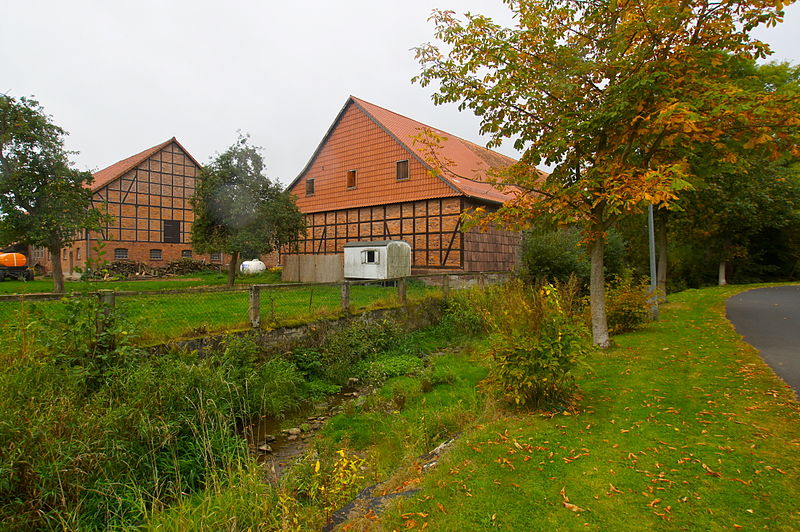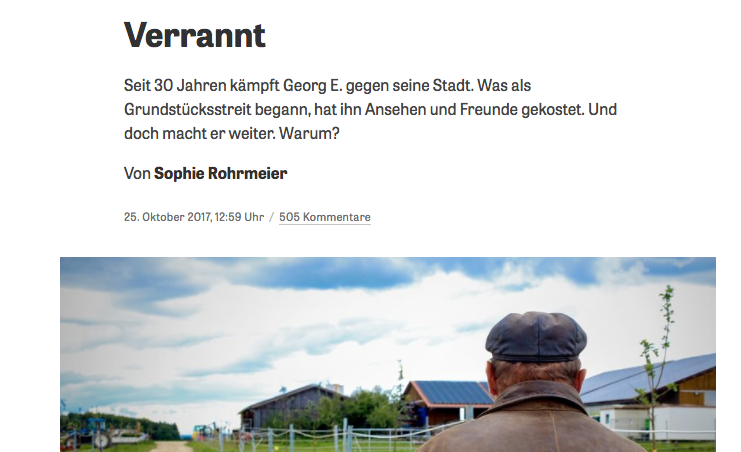Everything About This German Eminent Domain Saga is Completely Bananas
Starting with the fact that it’s a German eminent domain saga.

An unrelated German farm, which will also probably be sold to the state soon anyway. Photo: Flamenc/Wikimedia Commons.
Someone must have been fucking with Georg E.—for having done nothing wrong, he was taken from his bed and arrested one fine morning. All right, that’s not entirely true. Georg E. isn’t his real name, and he’s not been arrested in bed (yet)—but the entire government of his unnamed German city most certainly fucking with him. Whether or not he’s done nothing wrong? Up for debate.
Like Franz Kafka’s Josef K., Georg E. is embroiled in a legal battle; like K.’s, Georg E.’s juridical entanglements have consumed his life, and will almost surely do so until he dies. Unlike Kafka’s Trial, however, whose parameters are never made clear, the particularities of Georg E.’s particulars are readily apparent. They’re just fucking bananas. Indeed, this longform investigative piece in Die Zeit, by German journalist Sophie Rohrmeier, details the 30-year fight between Georg—whose full name and exact location we never learn—and the local authorities. At issue: the rights to his family farm, which the city has wanted to buy out and develop into subsidized apartments since before the fall of the Berlin Wall. Or, as Rohrmeier summarizes his view of things: “The city in which he lives wants to steal his farm from him.”

“Verrannt,” like every good German word, has two concurrent applicable meanings in this situation. It means “off on the wrong track” and “completely obsessed with something.” Huh. Screengrab: ZEIT ONLINE
This something that we here call an eminent domain conflict; indeed, being pissed off about eminent domain “land grabs” is so central to the American psyche it was the subject of an entire song on the “libertarian concept album” of this one girl I used to know in the early aughts who was really into Ayn Rand. (NB: I have looked for this album so that we could all stream it together, and I have failed in my research. I am sorry.)
OK, so that’s maybe not the most accurate metric, but every American has heard an eminent-domain sob story not unlike Georg E.’s: The evil State wants to take away someone’s hard-earned FARM to make a SCHOOL or APARTMENTS for the POORS, and that’s why we need GUNS, etc. (That’s trademarked, by the way, so if you try to steal any of it for your concept album, I get to shoot you.)
However, I guarantee that even in the eminent-domain-weary US of A, you have probably not seen a story like Georg E.’s, because this is eminent domain the way only a German could do it: with 500 percent more stubbornness, and 100 percent fewer firearms.
It all started in the early 1970s. Georg’s small, rural village (which today boasts around 1300 residents, all of whom cannot stand Georg E.) was incorporated into its neighboring larger city, a city that had immediate designs on the village farmers’ acreage: buy it; raze the farms; build suburban housing, some of it subsidized. The property owners to the east and west of Georg E. said Jawohl; so did those to the north and south. Soon, his farm became an “island,” the only fleck on a map otherwise owned by the state, the last blight standing in the way of a practical, affordable new housing tract.
But Georg DGAF. He wasn’t going to give up his farm, no matter what. His family was already regarded with suspicion in town thanks to a really tragic run of suicides in the 1970s and ’80s (his uncle; his sister; his mother), and as he continued to dig his heels in about his farm, the local authorities sought to make him a laughingstock.
In response, he sued and filed complaints. And then he sued, and complained, and sued and complained some more. He filed complaints against so many people and entities, so often, that according to Rohrmeier the records for most of them have been long lost. Georg has also written a veritable Man Without Qualities (i.e., thousands of plotless pages) of enraged missives to politicians, journalists, really anyone with a mailing address.
Sometimes this has landed him in hot water, such as the time he asked the local authorities, “Do I have to kidnap your children to get some answers?” Another time, he claimed that his ordeal was literally worse than the the Holocaust: “The direct murder of the Jews was probably more pleasant than the mobbing [I’ve been subject to] from the Mayor and the Administration,” he wrote in a lawsuit against the city, for real, and meant it.
Now it’s thirty years later, and his suits have been dismissed so many times no lawyer will represent him; Georg’s tenacity has also precipitated the dissolution of at least one long-term relationship (and loss of custody of a child), and is fixin’ to destroy his current marriage as well.
But for now, he still has his farm.
In German, eminent domain is called Enteignung (ent-EYE-gnoong), or “expropriation,” but you won’t hear German-language libertarian concept ballads about it, because struggles like Georg’s are uncommon enough to warrant 5000-word deep dives in the country’s premiere newsmagazine. This is because Germans at least nominally tend to value the common good before the needs of the individual (although tell that to Christian Lindner)—and because they adore rules and, well, following orders (ahem).
However, writes Rohrmeier, there is a largely marginalized portion of the German population that resents a government that won’t bend to the will of the individual—that is, each actual individual, all at once. To these Volk, she says,
a state can only be a good state, and a politician thereby a good representative, when he fulfills that constituent’s specific wish. The fact that compromises reached for the common good by nature cannot make everyone happy has no place in this belief system. And yet, it’s what drives Georg E. to the point of extreme desperation—and it has made him a very lonely man.
For on the rare occasion that a German believes he stands on the side of Gerechtigkeit (guh-WRECKED-ik-kite, or “justice”) and the Gericht (guh-RICKED, or court) does not, his stubbornness will topple friendships, destroy families, and span decades. In one of the many times the local government mocked Georg E., the mayor of his district described him thus: an “unstable, embittered farmer and a crank, whose stress is entirely self-created (Michael Kohlhaas says hello).” This refers to the classic novella by Heinrich von Kleist, about a wronged horse trader who goes to the gallows (triumphantly!) rather than admit he was not 100 percent right about every moment of his crusade against the government, some of which involved setting most of Germany on fire.
This, by the way, marks the fourth Michael Kohlhaas cameo on these pages in eight months. You might think this means that I have only read one book, which is true. But you know what else it proves? That Kleist’s incendiary (literally!) work of fiction from 1808 just happens to be the most accurate rendering of what a German acts like when he’s been wronged. That might seem strange over here, where we always feel wronged by the government, for one, and to express our displeasure we do far more reasonable things—such as amass armaments, and record libertarian concept albums.
